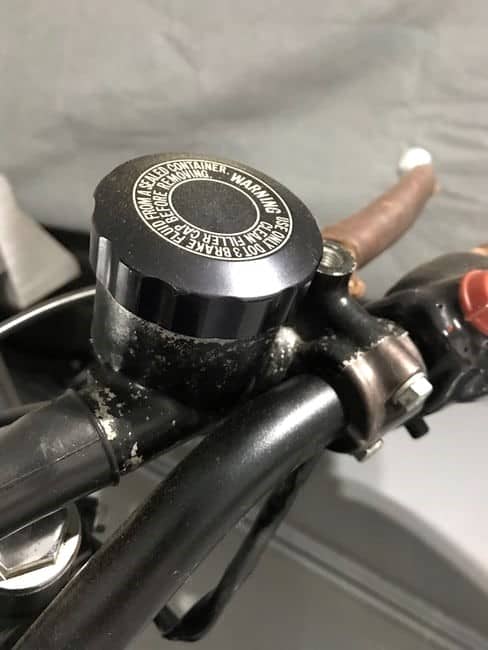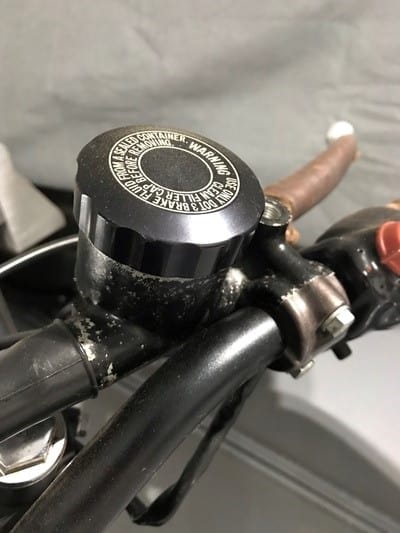
Imagine you walk out one day and see that some fluid has been leaking out of your motorcycle. You closely inspect it and find that the fluid is not engine oil but is in fact brake fluid. Is this bad? Is this something that you need to fix right away?
Why is my motorcycle leaking brake fluid? If you notice that your motorcycle is leaking brake fluid, it’s likely coming from a faulty hose, loose bleed caps on the bottom of the front calipers, from an old/corroded master cylinder, or from an old/corroded brake fluid reservoir.
Leaking brakes is a safety hazard for you and anyone else on the road. If the leak continues, the fluid level will continue to drop until your stopping power is not enough. It is important to remember that your braking system is a hydraulic system; without hydraulic fluid, the system does not work at all. As you decrease the amount of fluid below an acceptable level, you are decreasing the effectiveness of the system. Leaks can also introduce air into your lines which will also decrease the effectiveness of your brakes.
Why Your Motorcycle Is Leaking Brake Fluid
It is important to remember that your motorcycle’s brake system is a closed system meaning that fluid never leaves. It only gets used over and over again until it finally gets changed out for new fluid. Even if you do not notice visible leaks from your motorcycle, if you notice that your brake fluid level is dropping, there is definitely a cause for concern there.
The only ways that your brake fluid level could be reading low is if you are leaking fluid out somewhere or if your brake pads are very worn. This will cause your fluid level to appear lower to make up for the excess pad travel. If your brake pads are fine, you absolutely have a leak somewhere. You will immediately want to take a look into this and find out what the issue is.
So, if you notice that your bike is leaking brake fluid, what could it be? The answer is that there are potentially a ton of different causes. There is no simple answer to this question without thoroughly inspecting the bike itself. Likely the most common places for a motorcycle to leak is on the brake lines or on the bleed caps.
The brake lines are what carry the fluid to the piston. These lines are exposed to the environments and can occasionally be worn to the point where they start to leak. Try to see if you can find any fluid running down the hose itself to try to identify the leak location. If you find that a hose is leaking it is best to replace it immediately with a new hose.
Your bleed caps are located at the bottom of your front calipers. These are small round caps that you can use to bleed out any fluid through the system. These oftentimes can become too loose, allowing fluid to escape. So, check around this area for any oily residue.
Another possible location of a leak is the motorcycle master cylinder. This can be a very difficult leak to find as the fluid can run down the entire motorcycle covering brake lines and other brake components.
This can make it very easy to misdiagnose your braking system and replace a component that actually isn’t leaking. As your master cylinder goes bad, it can start leaking. Try cleaning up the area around the master cylinder, as well as any other components that have brake fluid on them to try to verify whether or not the master cylinder itself is leaking.
The other most common place for you to find a brake fluid leak is from the brake fluid reservoir itself. These are generally made of fairly cheap plastics and can develop leaks. If these starts to leak, it is generally pretty simple and cheap to replace them entirely. Just make sure to properly prime your braking system afterwards.
How To Fix Brake Fluid Leaks
Fixing a brake fluid leak is usually pretty straightforward. What causes people most grief is finding the leak itself. When you notice that your motorcycle is leaking brake fluid, you need to be methodical and scientific.
Oftentimes we trust too much in online forums and just because an individual online says that a certain part on a certain bike is almost always the cause of a leak does not necessary mean that that’s the cause in your case. It is important that you always find the source of the leak first before changing out any parts. This will save you money and time down the road.
The next step is to properly clean everything. Cleaning everything will make it much easier to find the leak. If brake fluid is dripped from the top of the system all the way down, it can become extremely difficult to know exactly where the leak is and if there are multiple leaks.
Once you have everything all cleaned up, you will want to start your visual observation from the top down. Depending on how bad the leak is, you may need to pull the brakes in order to create pressure in the system. This can help expose that mysterious leak.
Generally, any component that is found to be leaking should be replaced immediately. These are generally fairly straightforward remove and replace processes. If you open the brake system at all though, you will introduce air into the system. This will need to be bled out after the system has been closed again.
Safety Tips To Consider While Handling Brake Fluid
When working with your bikes braking system, it is also important to be aware of how to properly handle brake fluid. First of all, remember that brake fluid is extremely corrosive. Brake fluid is hard on almost any material or surface. It can entirely strip paints and eat up plastics.
Components used for the brake system are especially designed to handle this corrosive material. Anything else on your motorcycle is not meant to be exposed to this fluid. If brake fluid gets on anything that it should not, it is important that you clean it up as quickly as possible.
Brake fluid is also very toxic. You will want to avoid contact with your skin and eyes. Although an extreme injury to you skin or eyes may be unlikely, the brake fluid can be an irritant that can cause pain and redness. Always use gloves and eye protection any time you are handling brake fluid.
Where brake fluid becomes much more concerning is if it is swallowed. If you accidently swallow brake fluid, you should contact a poison control center immediately. Swallowing brake fluid can be fatal. It also can very quickly destroy your liver and kidney. Medical attention will be needed quickly to reduce the harmful effects. That is why it is also important that you keep brake fluid away from children and pets at all times.
Do You Need To Bleed The Brakes After Fixing A Leak?
When your brakes are leaking or if you change out a component in your braking system, air will be introduced into your system. This can be extremely dangerous. In the branch of fluid mechanics, which is the study of forces and effects of fluids, it is stated that liquids are incompressible.
The amount of pressure required to compress a liquid even a small fraction is so immense that it is often ignored entirely. Gasses on the other hand compress very easily. You can see this while putting air in your tires.
When you have a mixture of brake fluid and air in your tires, you now have one fluid that will compress and one fluid that won’t compress. When you pull on the brake lever, the master cylinder will compress the air bubbles rather than moving the slave cylinder.
The effects of this are largely determined by the amount of air in the lines. Only a small amount of air will limit the amount of movement of the slave cylinder as a portion of the pressure is used to compress the air. If too much air is in the system, the slave cylinder may not move at all.
This is why it’s important you bleed your motorcycle’s brakes after fixing a leak. Near the bottom of your calipers is a bleeder valve. You will want to connect a small piece of hose from this bleeder valve into a bottle or bucket. You will want to squeeze the brakes on the bike and then open the bleeder valve about half a turn.
You’ll see a small amount of brake fluid and air leave the system. From here, close the bleed valve and release the brake lever. You will need to continue repeating this same process until all that comes out of the bleeder valve is brake fluid.
Once you no longer have any air bubbles, your system is completely drained. Also be sure when bleeding the brakes to keep an eye on the fluid reservoir. If you ever let the fluid get too low, you can then start to suck air into the system and be forced to start the whole thing over again.

